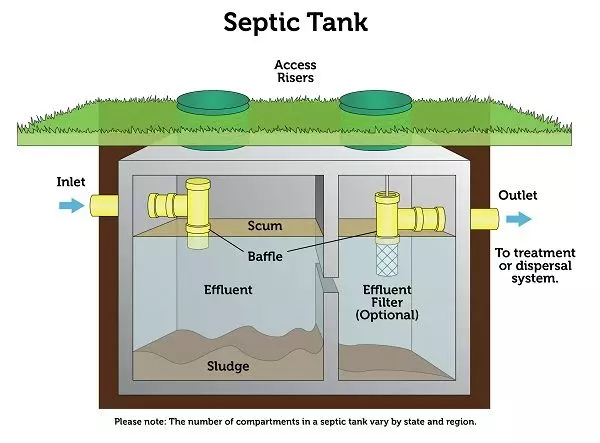Buying or Selling a home that has a septic tank...

When buying or selling a property with a septic tank, it’s essential to understand the functionality, maintenance, and potential issues associated with this critical component. A well-maintained septic system ensures a safe and efficient wastewater treatment process, protecting both the property and the environment.
What is a Septic Tank?
A septic tank is an underground wastewater treatment system commonly used in areas without centralized sewer systems. It consists of a tank that collects and treats sewage from the property, allowing solids to settle at the bottom while liquids flow out to a drain field for further purification.
Types of Septic Systems
Conventional Septic Systems:
- Gravity Systems: Relies on gravity to move effluent from the septic tank to the drain field.
- Pressure Distribution Systems: Uses a pump to distribute effluent evenly throughout the drain field.
Alternative Septic Systems:
- Aerobic Treatment Units (ATUs): Introduces oxygen to break down organic matter more efficiently.
- Sand Filter Systems: Uses sand to filter and treat effluent before it reaches the drain field.
- Mound Systems: Elevated drain field used in areas with shallow soil or high water tables.
STEP Systems
A Septic Tank Effluent Pump (STEP) system is a type of septic system that uses a pump to transport effluent from the septic tank to a community sewer system or a local treatment area. This system is particularly useful in areas where traditional gravity systems are not feasible.
How STEP Systems Work:
- Collection: Wastewater flows from the home into a septic tank, where solids settle at the bottom and liquids rise to the top.
- Pumping: The liquid effluent is pumped from the tank to a community sewer system or treatment area, preventing the buildup of solids in the pump and downstream components.
- Advantages: STEP systems are effective in areas with difficult terrain, such as high water tables or rocky soil, and they reduce the biological load on downstream treatment systems.
How Septic Tanks Work
- Collection: Wastewater from the home flows into the septic tank.
- Separation: Solids settle at the bottom, forming sludge, while oils and grease float to the top, forming scum.
- Decomposition: Bacteria in the tank break down organic matter.
- Effluent Discharge: Partially treated liquid (effluent) flows out to the drain field for further purification.
Maintenance Tips for Septic Tanks
Regular Inspections:
- Schedule annual inspections to check for leaks, sludge levels, and overall system health.
- Inspect the tank’s baffles and tees to ensure they are functioning correctly.
Pumping:
- Pump the septic tank every 3-5 years, depending on usage and tank size.
- Regular pumping prevents sludge build-up, which can lead to system failure.
Water Conservation:
- Fix leaky faucets and toilets to reduce the amount of water entering the septic system.
- Install high-efficiency fixtures and appliances to conserve water.
Proper Waste Disposal:
- Avoid flushing non-biodegradable items, such as wipes, feminine hygiene products, and grease.
- Use septic-safe toilet paper and household cleaners to prevent tank damage.
Common Septic Tank Issues and Solutions
Clogged Pipes:
- Signs: Slow drains, gurgling sounds, and sewage backups.
- Solution: Have a professional plumber clear the blockage and inspect the system for underlying issues.
Drain Field Failure:
- Signs: Pooling water, foul odors, and lush vegetation over the drain field.
- Solution: Reduce water usage, avoid heavy machinery on the drain field, and consult a septic system professional.
Tank Overflow:
- Signs: Sewage surfacing around the tank or drain field.
- Solution: Pump the tank, reduce water usage, and inspect for leaks or damage.
Bacterial Imbalance:
- Signs: Foul odors and slow decomposition of waste.
- Solution: Avoid using harsh chemicals, and consider adding beneficial bacteria additives.
Regulations When Buying or Selling Property with a Septic System
When transferring property ownership, various regulations must be met to ensure the septic system is functioning correctly and does not pose environmental or health risks.
Inspection Requirements:
- Every county has different requirements, for example, in King County, Washington, properties with septic systems must be inspected by a certified on-site system maintainer before the transfer of title. Sellers must schedule this inspection and provide the report to the buyer and local health department.
Maintenance Records:
- It is recommended to keep detailed records of all septic system maintenance, including pumping, inspections, and repairs. This documentation is valuable for buyers and can facilitate the sale process.
Disclosures:
- Sellers must disclose the presence and condition of the septic system, including any known issues, to potential buyers. Providing maintenance records can help demonstrate proper care and compliance with regulations.
Tips for Buying or Selling Property with a Septic Tank
For Buyers:
- Request a septic system inspection as part of the home inspection process.
- Review maintenance records to ensure the system has been properly cared for.
- Understand local regulations and requirements for septic systems.
For Sellers:
- Provide detailed maintenance records to potential buyers.
- Ensure the system is pumped and inspected before listing the property.
- Address any necessary repairs or upgrades to the system.
Understanding how septic tanks work, maintaining them properly, and recognizing potential issues are essential steps in managing a property with a septic system. Whether buying or selling, being informed about septic tank maintenance and functionality ensures a safer and more efficient wastewater treatment process.
Tips You Don't Want to Miss
Turn Your Septic System Concerns into Confidence!
Protect Your Septic System:
- Regular Inspections: Schedule annual inspections to check for leaks, sludge levels
Categories
- All Blogs (80)
- Agent (3)
- Appraisal (1)
- Buyers (23)
- Educational (4)
- Escrow (1)
- FHA (3)
- Financing (4)
- First time homebuyer (6)
- Home Buying Criteria (3)
- Homeowners (6)
- Loans (2)
- Market Conditions (19)
- Miscellaneous (4)
- Multiple Offers (2)
- NAR (1)
- Negotiation (2)
- Offers (2)
- School Districts (1)
- Sellers (28)
- Selling (32)
- Staging (3)
- Tips (11)
- Title (1)
- Utilities (4)
- Videos (1)
Recent Posts










GET MORE INFORMATION


